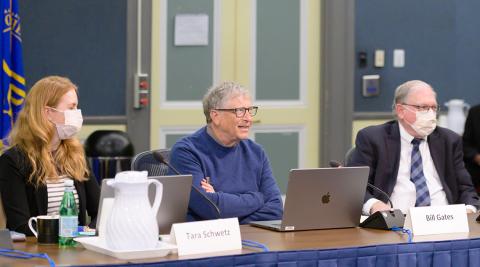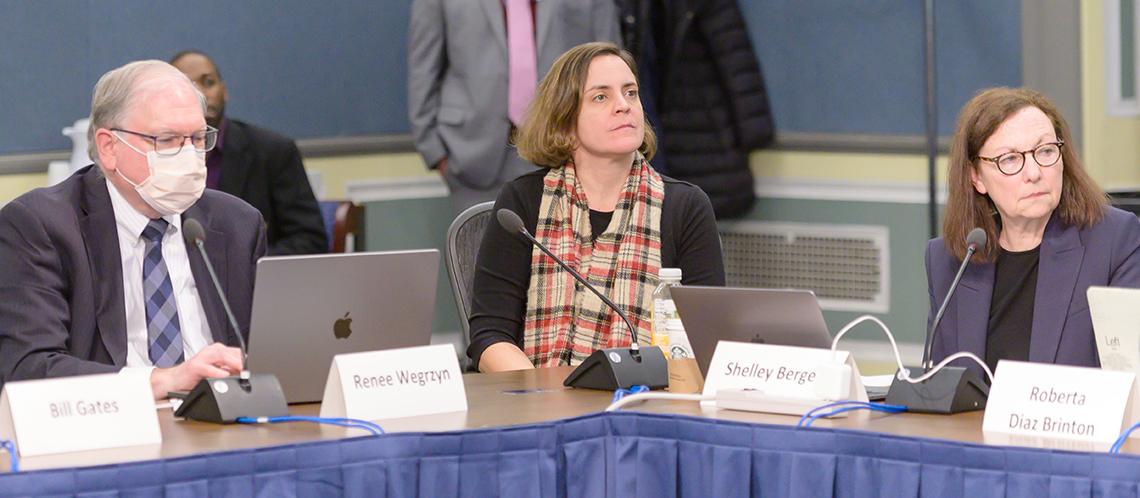‘Moving Ahead’
ACD Hears of Progress on Several Fronts

Photo: Marleen Van Den Neste
Nearly a year to the day that NIH’s 16th director stepped down, interim leader Dr. Lawrence Tabak presided over the 125th meeting of the advisory committee to the director (ACD) on Dec. 8-9. He presented a packed agenda and a strong message.
“At some point we will have a permanent director,” noted Tabak, who is performing the duties of NIH director. “But until that time, understand this: The institution is in great shape due to the efforts of the remarkable team of people we have…We are moving ahead…because the science can’t wait. Our patients can’t wait.”
The twice-yearly meeting—conducted both in person in Bldg. 1’s Wilson Hall and virtually, due to continuing Covid-19 safety precautions—proceeded as usual with a summary of activities over the past 6 months, announcements of top-level appointments and departures as well as updates on the NIH budget and legislative outlook.
Guest Speaker Gates Discusses Global Health
Business magnate and philanthropist Bill Gates, visiting campus for an annual NIH-Bill & Melinda Gates Foundation workshop on global health (see story, p. 5), made a brief guest appearance on day one.
“The Gates Foundation is a little different than NIH,” he pointed out. “We have overlapping missions but with slightly different emphases. Our focus is on the inequities of global health. We look at what people die of, or what causes their life to be unhealthy, in poor countries. Malnutrition, HIV, malaria—we’re very disease-specific. Our metric is, are we doing things that reduce those deaths.”
The foundation averages about $6 billion in grants per year, he said, “and that’s a mix of upstream work where NIH—particularly NIAID—is our most important partner, and downstream or delivery-related work, which is going into these countries and trying to help their primary health care system.”
In response to questions, Gates also discussed building research capacity, the promise of gene therapy and mRNA vaccines, and best practices from the foundation’s global endeavors that could succeed in U.S. regions similarly affected by health disparities.
First & Final Insights
The first day also heard from Dr. Renee Wegrzyn, inaugural director of the Advanced Research Projects Agency for Health (ARPA-H), who addressed the ACD for the first time. In contrast, Dr. Anthony Fauci spoke to the group for the last time as director of the National Institute of Allergy and Infectious Diseases; he retired at the end of 2022.

Photo: Marleen Van Den Neste
“Think of [the ARPA process] almost as a transaction,” Wegrzyn said, explaining how ARPA-H will work to solve high-risk, high-reward health problems. The new component is unique—it operates as an HHS entity, independent of but structurally located at NIH to take advantage of well-established administrative and scientific infrastructure.
ARPA-H program managers—essentially principal investigators gifted with remarkable agility, limited bureaucratic constraints and short tenure—drive the new component.
“We’re here to buy down the risk, show that something is possible and then it should leave the organization,” said Wegrzyn. “That’s why keeping those [partnership] relationships with NIH is so important…Program managers will be here for only a short period of time. They bring their ideas and pass them on. That’s the model. We’re constantly adding new program manager energy.”
Giving a presentation on lessons learned from pandemic preparedness and response, Fauci replied to an ACD member’s question about how to combat the rampant misinformation, which has become an enemy nearly as large as the virus.
“One thing we can do is to be very energetic about countering misinformation by flooding the system with correct information,” Fauci urged. “If there is anything we need to put a larger effort into it is to get the public to realize that the nature of science is self-correcting. The virus in January 2020 was different than the virus in July 2020 and is different than the virus we are dealing with today.”
Other reports that day included follow-up on several previous recommendations: a proposed framework for changes to peer review criteria and launch of two new ACD working groups—one on NIH’s investment in developing novel alternative methods and one on reimagining efforts to attract and expand biomedical research’s postdoc population.
“There are multiple forces that are affecting the decline in postdocs,” said Dr. Tara Schwetz, acting NIH principal deputy director, who presented data collected by the National Science Foundation. “We’re seeing lower numbers overall of postdocs, lower numbers of international postdocs in particular and fewer international grad students, which has an effect down the line.”
Progress Reports
On day two, the ACD heard an assessment of the public health threat of post-acute sequelae of SARS-CoV-2 infection and an update on the NIH Researching Covid to Enhance Recovery (RECOVER) Initiative. The group also received reports on the status of the ACD working group on diversity’s subgroup on individuals with disabilities and on NIH efforts to support open data.
“As scientists we know that data are the catalysts for all we do, but this has really been brought into focus by the Covid-19 pandemic,” said Dr. Lyric Jorgenson, acting NIH director of science policy, putting the issue into perspective.
Vaccine development for polio took almost 20 years, she recalled, but the mRNA vaccines against Covid-19 were developed in less than a year—a crucial advance made possible largely because of 21st century leaps forward in global scientific data sharing.
A progress report by UNITE co-chairs concluded the second day’s deliberations.
“I think what [NIH has] executed with the UNITE initiative is a blueprint for cultural, structural, organizational transformation,” said ACD member Dr. Roberta Brinton of the University of Arizona Health Sciences. “I’ve been involved in these kinds of issues before and they’ve never been like this—a well-conceived, well-executed, highly intelligent, science-based approach…I have to sing your praises.”
To view the full meeting recordings, go to https://bit.ly/3WCWEDU for day 1 and https://bit.ly/3WpTBPC for day 2.

Photo: Marleen Van Den Neste
